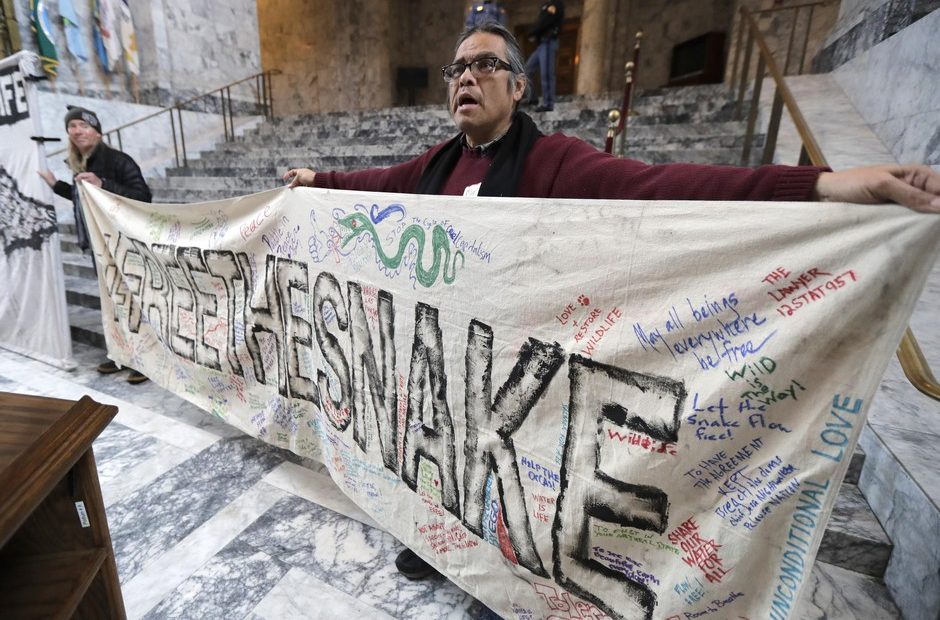
Dams, Salmon, Wolves: How Key Issues Played Out In Eastern Washington Congressional Races
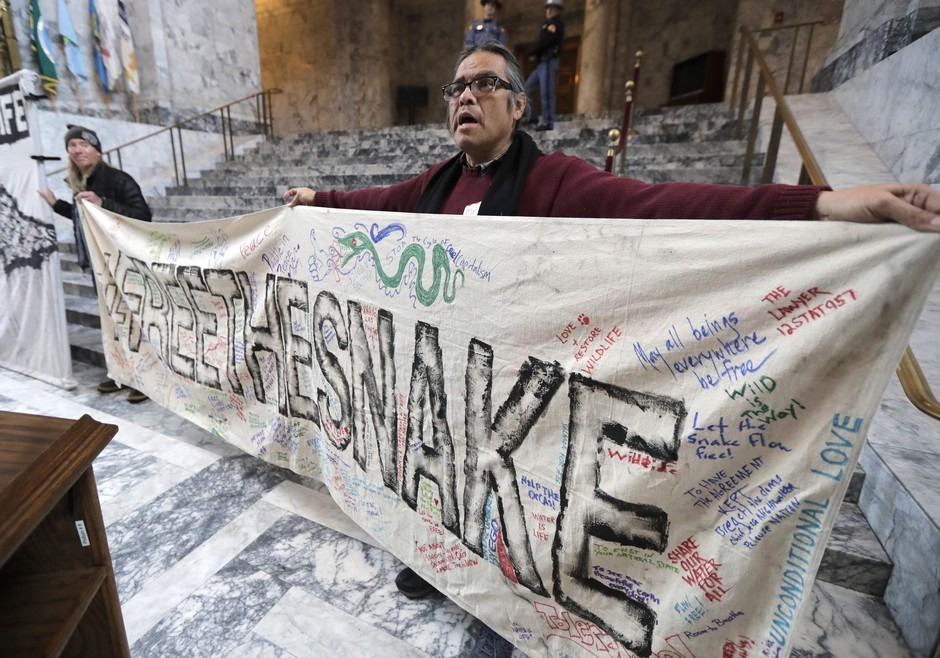
READ ON
NOTE: See regional election results, news and analysis this week here from NWPB’s Vote2020.
Some of the more contentious issues facing central and eastern Washington – questions over dams, salmon, energy and wolves – have popped up in congressional races this year.
Here is how candidates in Washington’s 4th and 5th Congressional districts have talked about key environmental and natural resource issues during the campaign:
Washington’s 4th Congressional District
In central Washington’s 4th District, incumbent Republican Dan Newhouse is seeking his fourth term. His challenger, Tri-Cities attorney Doug McKinley, acknowledges the race is an uphill battle for a Democrat. He’s argued for a quick transition to clean energy.
Newhouse calls himself a conservationist and a strong champion of the four Lower Snake River dams, which environmental groups have sought to remove. Newhouse says dams and salmon can coexist, through investments in new technology – like better fish passage and improved habitat.
McKinley told the Tri-City Herald editorial review board that he’s unsure how the final decision on dams should play out. He said salmon advocates and dam supporters need to be honest in their arguments and look toward fact-based science.
This is McKinley’s second time running for the 4th District. In 2016, he didn’t make it out of the August primaries. In 2014, he ran for the Washington state senate.
Newhouse has also led an effort to modernize the Endangered Species Act, an effort to streamline the act and protect property rights. Environmental groups said that would weaken species protections.
Newhouse supported the move to remove gray wolves in the Lower 48 from the Endangered Species Act. Newhouse and fellow Republican Cathy McMorris Rodgers previously co-sponsored similar legislation, saying wolves are in no danger of extinction.
Just today, Nov. 3, the federal government posted its decision to the Federal Register. States will take over wolf management in 60 days.
Washington’s 5th Congressional District
In eastern Washington, McMorris Rodgers is running for her ninth term in Washington’s 5th District against Democrat and businessman Dave Wilson.
Wilson has twice run as an independent, hoping to unseat McMorris Rodgers in 2014 and 2016. He lost his bid for a position in the Washington state House of Representatives in 2018.

More than 300 people gathered in Clarkston, Washington Jan. 7, 2020 to hear perspectives on the Lower Snake River dams. Ultimately a decision on their fate is up to Congress. CREDIT: Courtney Flatt/NWPB
McMorris Rodgers says she wants to counter the Green New Deal, which proposed to drastically reduce heat-trapping greenhouse gas emissions while creating clean energy jobs. McMorris Rodgers says Green New Deal supporters want a “complete government takeover of our economy,” according to her campaign page.
She has also strongly supported keeping the Snake River Dams in place. She’s long fought to increase hydropower.
At a candidate forum organized by the Lewis and Clark Valley Chamber of Commerce and the League of Women Voters of the LC Valley, McMorris Rodgers said Republicans have supported clean energy solutions that will help fight climate change, while not directly linking the two issues. She says removing Snake River Dams would have increased carbon emissions.
In an answer to questions from The Spokesman-Review, Wilson said the dams should remain in place until there’s a better plan to replace the green energy they produce.
McMorris Rodgers says the federal government needs to better manage national forests to reduce the number of catastrophic wildfires. She pointed to a collaborative plan in the Colville National Forest, known as the A-Z project, as a model for other forests.
Wilson says the federal government needs more resources for forest management. He says most of the Forest Service budget is now spent on putting out mega-fires.
Wilson said he didn’t think McMorris Rodgers believed in climate change, something he called an “existential threat.” He called for a national plan to combat climate change. He also said climate change is contributing to drier forests and longer fire seasons, which is why there has been an increase in recent large wildfires.
Related Stories:
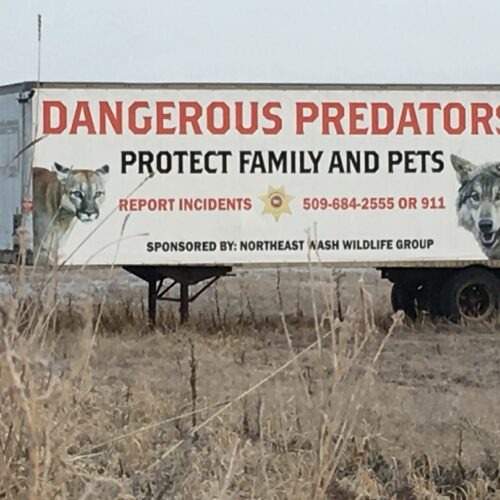
A Wolf In Northeastern Washington Was Killed Illegally. Here’s Why It’s A Big Deal
Wolf poachers go mostly undiscovered — but that hasn’t stopped nonprofit organizations from putting up significant cash rewards for information about these incidents. While rewards generally don’t lead to convictions, Defenders of Wildlife’s Gwen Dobbs says reward offers in cases of wildlife poaching can help raise public awareness, “hopefully serving as a deterrent against potential future incidents, even if a reward does not directly lead to a conviction.”
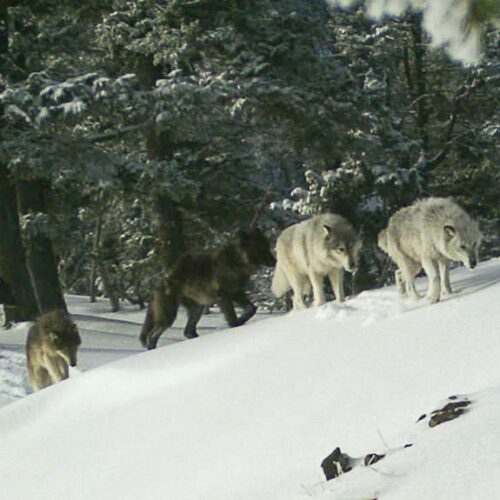
A Push To Revive Federal Protections For Wolves After New State Laws Allow More Killing
Wildlife advocates are pressing the Biden administration to revive federal protections for gray wolves across the Northern Rockies after Republican lawmakers in Idaho and Montana made it much easier to kill the predators.
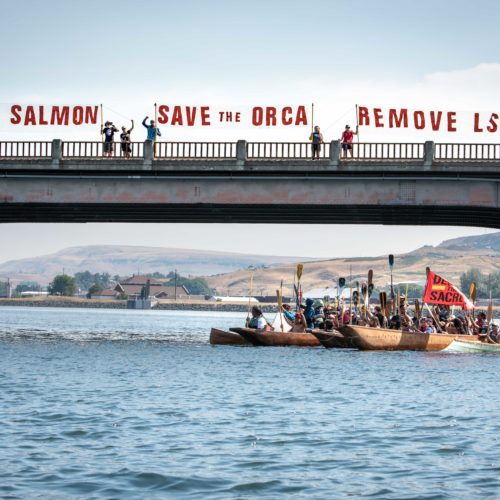
One Idea To Remove Snake River Dams May Be Dead In The Water. Inslee And Murray Oppose It
A wide-ranging proposal to save wild salmon by removing the four Lower Snake River dams may be dead in the water. Washington Gov. Jay Inslee and Sen. Patty Murray say any proposal for the controversial dams needs a “science-based,” “community-driven” approach.















